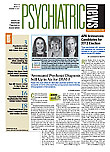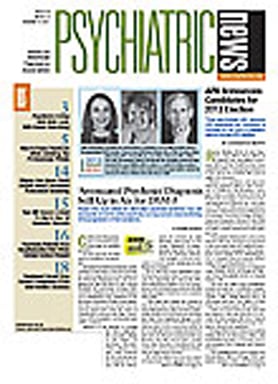Cognitive therapy can be successful in promoting clinically meaningful improvements in functional outcome, motivation, and positive symptoms in low-functioning schizophrenia patients with significant cognitive impairment.
That was the finding from a randomized trial to evaluate the efficacy of an 18-month recovery-oriented cognitive-therapy program to improve psychosocial functioning and negative symptoms of avolition-apathy and anhedonia-asociality in patients with schizophrenia. A report on the findings appears in the October Archives of General Psychiatry.
"The message for clinicians is, 'Don't give up on these low-functioning patients,' " lead author Paul Grant, Ph.D., of the University of Pennsylvania School of Medicine, told Psychiatric News . "They have hidden potential. Despite a long course of disorder, we have seen that these patients can improve and achieve their goals and develop a better quality of life."
Sixty participants were randomly assigned to the study intervention condition, which consisted of cognitive therapy plus standard treatment, or to the control condition of standard treatment alone. (Randomization was stratified by sex because females with schizophrenia have a better course and may respond better to cognitive therapy.)
A single-blind design was used in which outcome assessors were not aware of assigned study condition.
Participants in the cognitive-therapy intervention received up to 18 months of outpatient sessions. The sessions typically lasted 50 minutes and were scheduled on a weekly basis. The central features of this psychotherapy were its goal-directed framework and personalized treatment planning.
As described by Grant in a presentation at this year's International Congress of Schizophrenia Research, the intervention is a form of therapy developed especially for schizophrenia patients by Aaron Beck, M.D., the primary developer of cognitive therapy (Psychiatric News, May 20).
Specific deficiencies such as deficits in attention, executive function, and social skills were targets for the therapy. Later sessions were devoted to relapse prevention and consolidation of functional gains. The treatment was tailored to the participant's level of functioning, such that special adaptations were made for problems due to poor engagement, neurocognitive impairment, thought disorder, or lack of insight.
Standard treatment consisted, at a minimum, of antipsychotic pharmacotherapy. But most participants were also actively engaged in services provided by local community mental health centers, including case management, supportive counseling, day-treatment services, housing services, peer support, and vocational rehabilitation, the researchers noted.
Results showed that patients treated with cognitive therapy showed a clinically significant mean improvement in global functioning from baseline to 18 months that was greater than the improvement seen with standard treatment. Patients receiving cognitive therapy also showed a greater mean reduction in avolition-apathy and positive symptoms (hallucinations, delusions, disorganization).
There were no meaningful group differences in baseline antipsychotic medications (class or dosage) or in medication changes during the trial.
Traditionally, negative symptoms in low-functioning patients have been viewed as deeply embedded, possibly reflecting a neurobiological deficit in the most severe cases designated as "deficit syndrome." Grant told Psychiatric News that the study did not specifically recruit patients designated as having "deficit syndrome," but said the study results indicate that severe negative symptoms can respond to psychosocial therapy.
"The trial provides evidence that these low-functioning patients respond to psychosocial treatment, suggesting that their symptoms are not as entrenched as one might have expected based upon case histories and the literature on such patients," he said. "A treatment protocol with psychological targets, such as defeatist beliefs, works in this population, indicating they are like other patients and warrant a biopsychosocial formulation."

